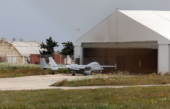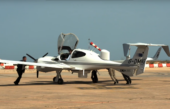Rejected asylum seekers are to be returned to their country of origin with “restraint techniques” and in a climate-neutral way.
Part of the EU’s migration policy is to return rejected asylum seekers to their countries of origin or to other third countries outside Europe. Frontex is to provide more support to the member states for these so-called “returns”. The term means the transfer to the country of origin of those concerned – either voluntarily or under coercion. Frontex has established a “European Return Centre” in Warsaw for this purpose in its 2019 renewed regulation.
Voluntary return is the “preferred type”, Frontex writes on its website, but this is only the case for 40 % of those concerned. Overall, “returns” under Frontex mandate are steadily increasing. In the Corona year 2020, there were around 12,000 people, in 2021 already 18,000 and last year around 25,000.
Almost all “returnees” are taken away by plane. This is according to a report submitted by Frontex for the second half of 2022. The document is not public, but has been posted online by the British civil rights organisation Statewatch. According to the report, two thirds of those affected are taken out of the EU on scheduled flights and one third on charter flights. By far the majority of flights are from only one member state, and to a lesser extent as “Joint Return Operations” from three or more member states. It isalso possible, that people are picked up by the destination country itself. In the second half of 2022, such “Collecting Return Operations” were organised with the help of Germany and France.
According to the document, most “returns” involving Frontex are carried out from France, Germany and Italy. This mostly concerns the international airports in Paris, Frankfurt and Rome. However, the measures are not always successful. In 1248 cases they were stopped because there were no papers, the refugees resisted, absconded, applied for asylum or fell ill with Corona.
The new “Return Centre” at Frontex is headed by former German Federal Police officer Lars Gerdes. Previously, Gerdes was head of a police’s training mission in Afghanistan for several years. To facilitate the work of the centre, Frontex is recruiting “European Return Liaison Officers” (EUR-LO) who will then be stationed in the destination countries of the “returns”. Frontex also sends “return specialists” to the countries, where they are to help obtain identity cards and provide “return and reintegration counselling”.
The EU border agency wants to organise the “joint returns” completely on its own in the future. So far, this has only been done in three cases, in which a total of 143 people were taken to Albania, Nigeria and Bangladesh in 2022 and 2023. According to a presentation by a Frontex official, there will be “at least four” more flights this year under Frontex’s sole responsibility, “and to new destinations”.
Frontex will take care of the preparation and implementation of these flights and will also take care of all necessary measures “after return”. This concerns the procurement of documents, contact with the consulates of the countries of origin of the persons concerned, the booking of flights and the preparation of passenger lists as well as the subsequent care in the destination country. Frontex awards contracts to various non-governmental organisations for this purpose.
Frontex escorts deportations with so-called “Forced Return Escort and Support Officers” (FRESO). They are part of the new armed intervention force that Frontex is setting up under the name “Standing Corps” and which is to comprise a total of 10,000 police officers and gendarmes by 2027. They are supposed to have good knowledge of “control and restraint techniques”. However, coercive measures by foreign police officers may only take place and under the supervision of authorities of the respective member state from which the deportation takes place.
In the semi-annual report, Frontex gives figures on deportation escorts deployed. According to the report, of a total of 65 officers, 21 were stationed at Frontex headquarters in Warsaw, 12 at Frankfurt airport, 11 in Rome, five each in Vienna and Paris, and three in Amsterdam. In total, they would have accompanied almost 4000 forced deportations. Most of the missions involved “assistance on the ground”, i.e. before departure. In Amsterdam, Frontex is active in about half of all cases for escorting in the transit area. In Frankfurt and Rome, the deportation escorts are deployed to accompany flights in about a third of the cases.
Frontex also provides medical staff and translators for the deportation flights and takes care of escorting human rights observers. For this purpose, the agency cooperates with the non-governmental ICMPD in Vienna. It was founded by former Austrian People’s Party (ÖVP) Foreign Minister and Vice-Chancellor Michael Spindelegger. However, only some of the flights are actually observed.
The document published by Statewatch also mentions cases in which the deportation observers found anomalies. In Munich, for example, the lack of police officers to return women and children was criticised. In Munich and Berlin, there was also no infrastructure for accommodating children, who therefore had to share a room with “disruptive or detained” deportees. Also in Munich, observers complained about a slippery gangway. In Hamburg, a refugee was medically examined in the presence of other persons. In Hanover, measures taken during a deportation were described as excessive, in that a person who was not actually conspicuous was nevertheless “restrained”.
EU member states are now encouraged to inform other governments about upcoming charter flights and to reduce costs by participating. If national return measures are pending, joint operations with other states are to be examined first. It is also possible to fly to several destination countries at once. The border agency also wants to expand in the area of scheduled flights. In a call for tenders worth €120 million, Frontex is looking for travel service providers.
In order to keep the carbon footprint low, the airlines’ climate protection offers are to be used for the “returns” and extra payments are to be made for them. The travel service provider sought in the tender should preferably book with airlines that comply with Frontex’s “Green Deal” programme.
Published in German in „nd“.
Image: Former Frontex director Fabrice Leggeri visits teams in Frankfurt (Frontex).





Leave a Reply